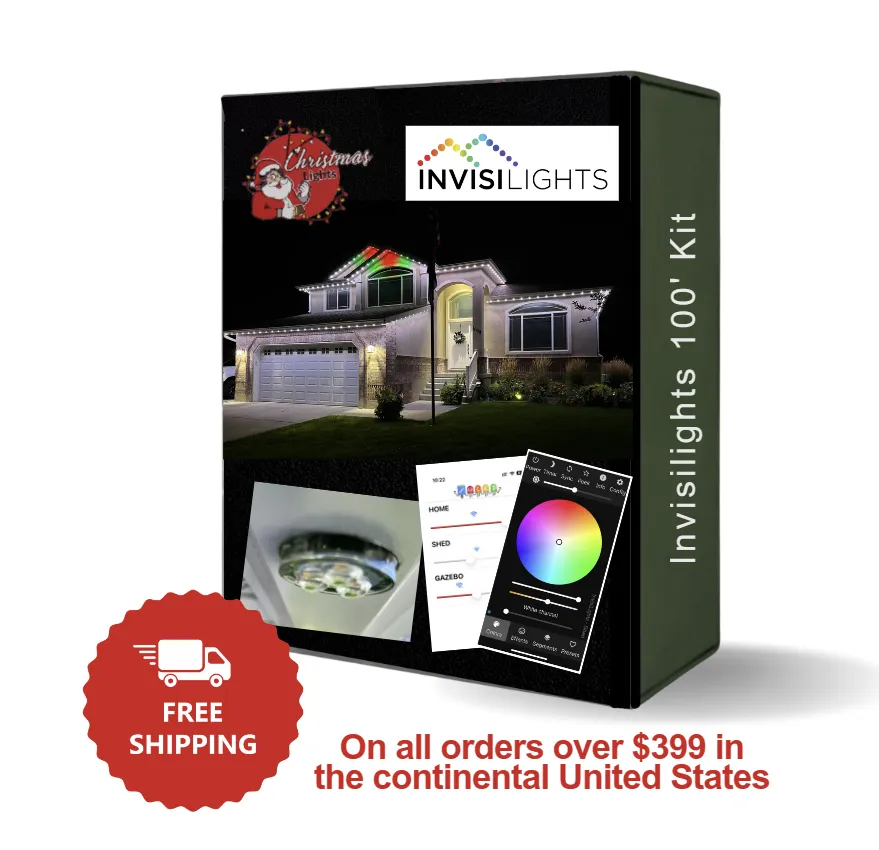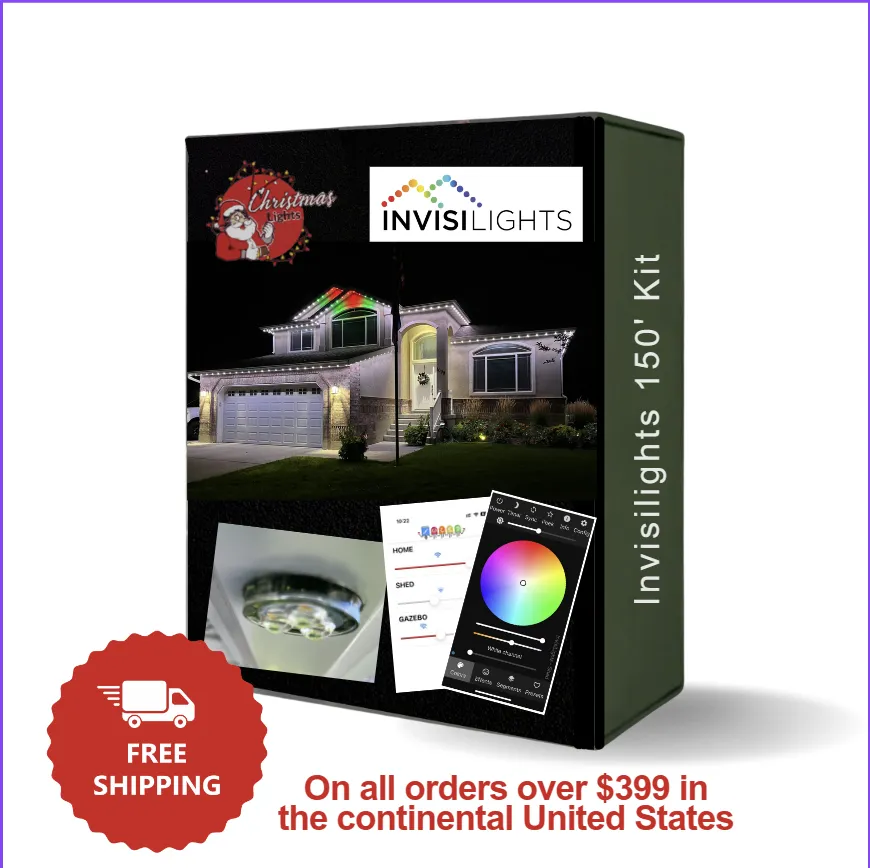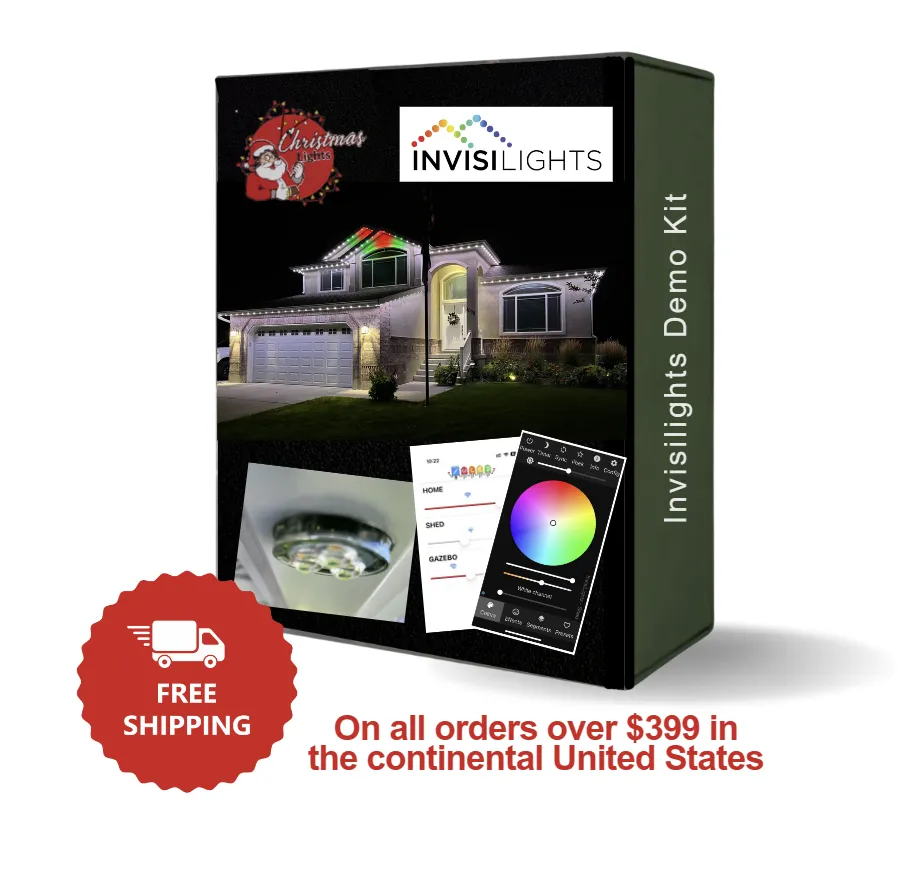Invisilights
Permanent Holiday Lighting
Customizable Lights for Any Event
WHAT YOU NEED TO KNOW BEFORE ORDERING
Total Linear footage of the installation.
This should include footage of lights and channel along with any Extensions or jumps you'll need to make
Where your controller box will be located
This is the most important step to planning out an installation, Without knowing where the controller will be you'll have no way to know the right materials to buy when it comes to extensions and accessories.
What Voltage system you want to use 24V or 36V
This is a decision you will make based on convince and efficiency, the most important factor with this will be the footage of each lighting run. If the total footage of a run is over 100' you'll need to either power inject on that run or switch to the 36V system that can go up to 200' before needing power injection.
Draw a Map
By mapping out the installation you'll be able to better understand and plan out the install giving you a better idea of what all you'll need to purchase to complete the job.
take the measurements from your map and add up the total number of materials you'll need.
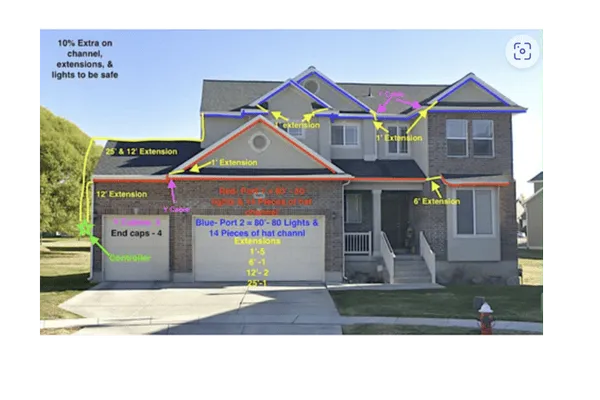
For the Map out example above the total material breakdown is:
System Voltage: 36V
Color of channel: Cameo
Channel Type: Hat
Total Lighted Footage: 160'
Power injection: NO
Controller: 1
Channel: 27- 6' sticks
Screws- 200
Lights: 175
1' extensions-7
6' Extensions-2
12' extensions-2
25- extensions- 1
Y Cables- 3
End caps- pack of 10
Absolute necessities
-Controller
-Lights
-Channel
-Screws
-Extension cables
Other Accessories
-Y Cable
-End Caps
- Signal boosters
-Power injection material
When would you need to power inject?
The controller will come with 3 outputs for your lighting runs, each 36V output can do a Max of 200', the 24V system can do a max of 100'. After that max you'll need to inject power. After you do so you can go an additional 100' with the 24V or 200' with the 36V system.
Power injection is needed due to voltage drop, voltage drop happens due to the length traveled away from the power source along with the gauge of the wire. due to the gauge of wire the lights and extensions run on it drops in voltage enough at 100' with the 24V system and 200' with the 36V system to effect the lights performance requiring a addition of power (Power Injection)
Materials needed for power injection 36V
Power injection pig female pig tale
Power injection Extension cables
Power injection T Cable.
Materials needed to Power inject 24V
16/2 - 12/2 Low voltage landscaping wire
Cut and Splice T cable
Water Proof Wire connectors
Discover the Transformative Power of Invisilights: Expertly Installed Permanent Lighting Solutions
Enhance your installation offerings with Invisilights, the premier permanent lighting solution designed for seamless integration into any property’s exterior architecture.
Crafted with high-quality aluminum channels and advanced LED technology, Invisilights delivers durability and superior energy efficiency—key selling points for your clients seeking long-lasting, cost-effective lighting solutions. Our system not only provides brilliant illumination but also boosts the aesthetic appeal and functionality of any home.
Offer your clients peace of mind with our robust 5-year warranty, ensuring reliable performance and minimal maintenance needs. This warranty supports your commitment to quality and customer satisfaction, making it easier for you to sell and install with confidence.
Our flexible, programmable system allows you to meet any client’s specific desires—from subtle accents to full-scale holiday displays—making it an adaptable choice for various applications. With Invisilights, you can cater to a wide range of preferences and needs, increasing your market reach and customer retention.
Choose Invisilights for your installations and add a transformative product to your portfolio that will impress clients and ensure your services remain in demand for years to come.
Frequently Asked Questions
What exactly comes in the 150' InvisiLights permanent outdoor lighting kit?
The InvisiLights kit is comprehensively equipped to ensure you have everything you need for installation. Each kit includes:
27 sticks of 6-foot Aluminum Channel to house and protect the lighting elements.
150 feet of dynamic RGBW LED Lights, which includes 23 sets of 6-count and 14 sets of 1-count lights, allowing for extensive coverage and diverse configuration options.
2 Data Boosters to enhance signal strength across the lighting installation, ensuring consistent control and color output.
A 320W Power Supply capable of supporting up to 190 puck lights, providing ample power for even the most extensive setups.
1 GFCI Outlet Adapter to ensure safe outdoor electrical connections.
1 Controller that allows you to manage and customize the lighting effects easily.
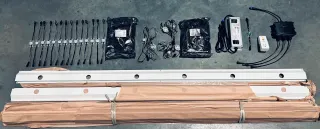
Will I need any additional components besides what's included in the Invisilights permanent lighting kit?
While the Invisilights kit comes with all the essential components for a standard installation, there are a couple of scenarios where you might need additional items:
Jumper Wires: Depending on the layout of your installation and the number of gaps or 'jumps' between the sections of lights, you may require jumper wires. These wires help bridge the gaps without losing the continuity of the light sequence, ensuring a smooth and uniform display across more complex architectures.
Data Boosters: If any section of your lighting setup is more than 15 feet away from the control box, additional data boosters will be necessary. Data boosters help maintain the integrity and brightness of the lights over longer distances, ensuring consistent performance throughout your installation.
Can I choose the color of the aluminum channel for my InvisiLights kit?
Yes, you can select your preferred color for the aluminum channel to match your home’s exterior or personal taste. Please make sure to specify your color choice in the notes at checkout when you place your order.
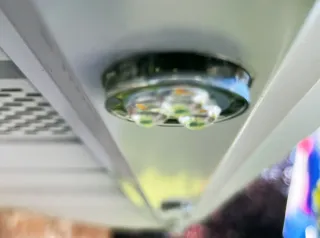
How do the included components of the InvisiLights kit enhance the lighting system?
Each component in the InvisiLights kit plays a crucial role in creating an effective and stunning lighting display:
Aluminum Channels: Provide a durable, weather-resistant housing for the LED lights, which helps in maintaining a clean and nearly invisible look during the day.
RGBW LED Lights: Offer vibrant, full-spectrum color and white light combinations, making it perfect for any occasion from festive holidays to elegant ambient lighting.
Data Boosters: Ensure that the signal remains strong across longer distances, which is crucial for larger installations.
Power Supply: Designed to efficiently handle the energy needs of the system without overload, ensuring safety and durability.
GFCI Outlet Adapter: Adds an extra layer of safety by protecting against electrical shorts and surges, particularly important in outdoor settings.
Controller: Provides the flexibility to customize and control the lighting sequences, colors, and patterns right from your smartphone or controller, adding convenience and advanced functionality to your lighting system.
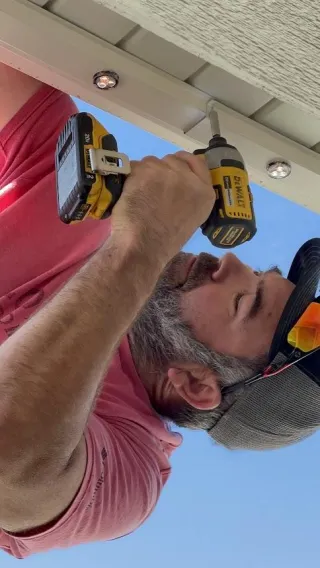
Can I use Invisilights year-round?
Absolutely! Invisilights are designed for versatile use throughout all seasons. Whether you're celebrating a special occasion, setting a mood for a party, Love your favorite sports team, or simply enhancing your home's ambiance, our lighting systems provide the perfect solution for any event, big or small.
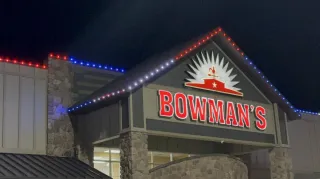
Can I set timers and events for Invisilights?
Yes, Invisilights feature advanced programmable settings that allow you to schedule lighting for specific events and automate timers. This functionality ensures that your lighting preferences are perfectly aligned with your lifestyle, turning on and off at predetermined times without any manual intervention.
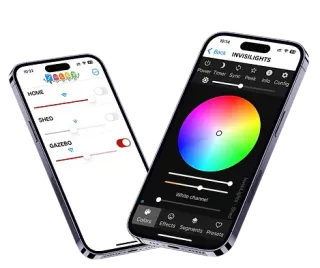
Is it possible to achieve warm or soft white with Invisilights?
Absolutely, Invisilights are equipped with RGBW technology, which includes a dedicated white LED alongside the standard red, green, and blue LEDs. This addition allows the system to produce authentic warm white, soft white, and various other shades of white with greater accuracy and intensity compared to traditional RGB systems. This capability ensures that you can effortlessly tailor the lighting to fit the desired ambiance and aesthetic of any environment, providing precise control over both vibrant colors and the subtlety of different white tones.
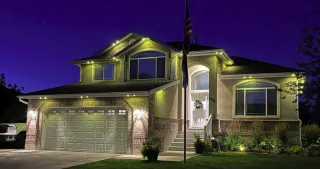
How do you ship your product?
Our products are shipped directly from our warehouse using reliable shipping carriers to ensure timely and safe delivery. Each product is securely packaged to prevent damage during transit, and we provide tracking information so you can follow your order’s journey to your doorstep.
Where are the controller and power supplies installed?
The controller and power supplies for Invisilights are typically installed in an accessible location such as a garage or utility room. These components connect to your home’s WiFi network, allowing seamless control over the lighting system via our user-friendly mobile app.
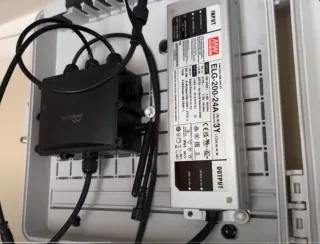
How long do Invisilights last?
Invisilights are engineered to last, with each LED bulb boasting a lifespan of over 50,000 hours. Given a typical usage of 10 hours per night, this translates to approximately 5,000 nights. This means your Invisilights could illuminate your home's exterior for nearly 14 years under these conditions, ensuring that your investment not only adds beauty but also long-term value to your property.
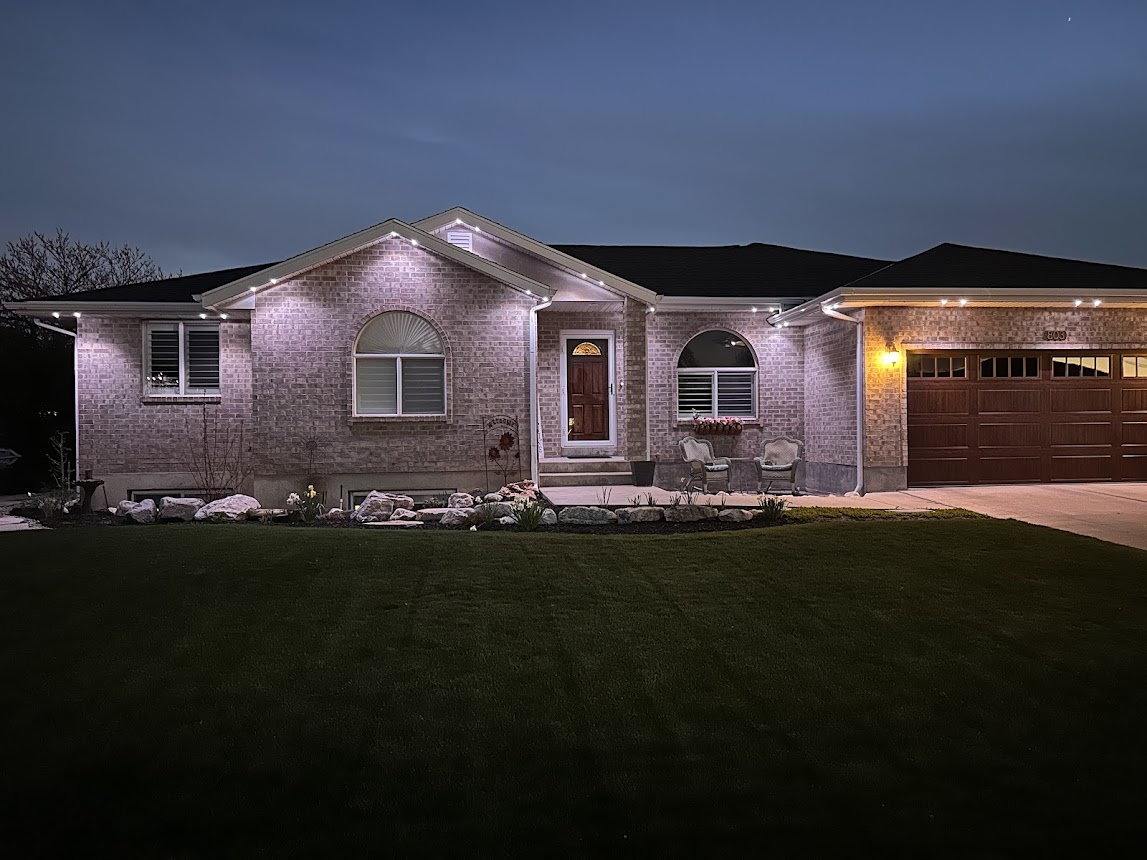
Are Invisilights dimmable?
Yes, all Invisilights are fully dimmable. This feature allows you to adjust the intensity of the light to suit various occasions, from a soft glow for a romantic evening to bright, vibrant colors for a festive celebration.

What types of custom channels are available?
Invisilights offers two types of custom channels, available in 40 different colors, ensuring a nearly invisible installation. These channels are designed to blend seamlessly with your home’s architecture, providing discreet yet effective lighting.

Can I control different zones independently?
Yes, the Invisilights system supports multiple zones which can be controlled independently or synchronized. This functionality allows for intricate lighting designs that can vary across different areas of your home, enhancing the overall impact and utility of your installation.
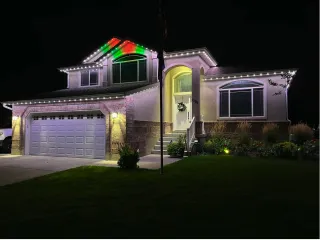
What is outdoor permanent lighting?
Permanent lighting refers to architectural-grade lighting systems that are installed permanently on your property to provide year-round illumination.
How does permanent lighting differ from traditional holiday lighting?
Unlike traditional holiday lighting, which is typically temporary and used only during specific seasons, permanent lighting is installed once and can be used throughout the year for various occasions
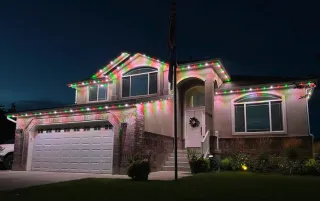
Discover Expert Tips on Our Blog

How to Go From $50K to $500K Christmas Lights
November brings snow, cold weather, and the critical window when Christmas lights businesses generate the majority of their annual revenue. For installers who've completed their first season generating $50,000-$100,000, the question becomes: how do you 10x that revenue to reach $500,000 or even a million dollars? The answer isn't working harder or installing more lights yourself—it's understanding the mathematics of scaling, implementing systems, and making strategic investments that multiply results.
This comprehensive guide reveals the exact frameworks successful installers use to scale from modest side hustles to legitimate six-figure and seven-figure businesses. These aren't theories—they're proven strategies that have helped installers go from broke garbage collectors to million-dollar business owners in under five years.
The Mathematics of Scaling: Why Average Ticket Determines Everything
Before discussing marketing strategies or hiring practices, understand the fundamental mathematics that determines whether scaling is possible. The equation is simple: Total Revenue = Number of Jobs × Average Ticket Price × Close Rate
The $50,000 Scenario at $1,000 Average Ticket
To generate $50,000 at $1,000 average ticket with a 20% close rate:
You need 50 completed jobs
At 20% close rate, that requires 250 leads
One crew can handle 50-75 jobs comfortably in a season
This is achievable for most installers. One crew, manageable lead flow, reasonable workload.
The $500,000 Challenge at $1,000 Average Ticket
Now scale to $500,000 at the same $1,000 average ticket:
You need 500 completed jobs
At 20% close rate, that requires 2,500 leads
That requires 6-8 crews working simultaneously
Managing 2,500 leads means sophisticated CRM systems, multiple salespeople, and complex logistics
The operational complexity becomes overwhelming. You're not running a Christmas lights business—you're running a logistics operation that happens to install lights.
The $500,000 Reality at $2,000 Average Ticket
Now calculate $500,000 at $2,000 average ticket:
You need 250 completed jobs
At 20% close rate, that requires 1,250 leads
That requires 2-3 crews maximum
One owner-operator handling sales can manage 1,250 leads with proper systems
This is why average ticket is everything. Doubling your average ticket doesn't just double revenue—it cuts operational complexity in half while maintaining the same revenue target.
One successful installer does over $1 million annually with 2-3 crews because he maintains $3,000-$4,000 average tickets. Another installer doing the same revenue runs 10-11 crews at $1,000 average tickets. Same revenue, vastly different stress levels and operational complexity.

Breaking the Average Ticket Ceiling: From $1,000 to $2,000+
Most installers plateau at $800-$1,200 average tickets because they quote only what customers explicitly request. When someone asks for "Christmas lights on my house," they quote the front roofline—period.
The Comprehensive Quoting Methodology
Present every property with a complete vision:
Front Roofline (Basic): Gutters and peaks facing the street - $800-$1,200
Ridge Lines and Architectural Details: Add peaks, hips, and ridge caps - Additional $400-$800
Ground Stake Pathway Lighting: Line walkways from sidewalk to entrance - Additional $300-$500
Tree Wrapping: Price at $30-$60 per foot of tree height. A 15-foot tree is $450-$900. Most properties have 2-3 wrappable trees.
Columns and Posts: $100-$600 per column depending on height
Wreaths: 48-inch wreaths at $200-$450, 60-inch wreaths at $350-$800
Garland: $180-$250 per 9-foot section, with most doors requiring 2-3 sections ($500-$750)
When you present all options, customers frequently select $2,500-$4,000 packages. When you present only rooflines, they select $1,000 packages. You cannot buy what isn't offered.
The Psychological Barrier
Many installers experience physical discomfort sending $4,000 quotes. The internal dialogue runs: "I would never pay $4,000 for Christmas lights. They'll think I'm crazy. I can't send this."
This reveals the fundamental problem: you're projecting your financial situation onto customers living in $750,000-$1,500,000 homes.
Consider the typical premium customer profile:
Mortgage payment: $8,000-$10,000 monthly
Vehicle payments: $2,000+ monthly for two vehicles
Starbucks habit: $300+ monthly ($3,600 annually—just on coffee)
Designer purchases: $5,000-$10,000 purses and shoes
These customers don't think like you. They're not shopping for the cheapest option—they're seeking the best experience, most reliable service, and least hassle. When presented properly, $3,000-$4,000 for professional holiday lighting is a minor expense that creates priceless family memories.
One installer's customer filmed her family's reaction pulling into the driveway after installation. The kids screamed with excitement, the parents cried with joy—that moment was worth $10,000 to that family, not just the $4,000 they paid. That's the magic you're selling, not bulbs and clips.
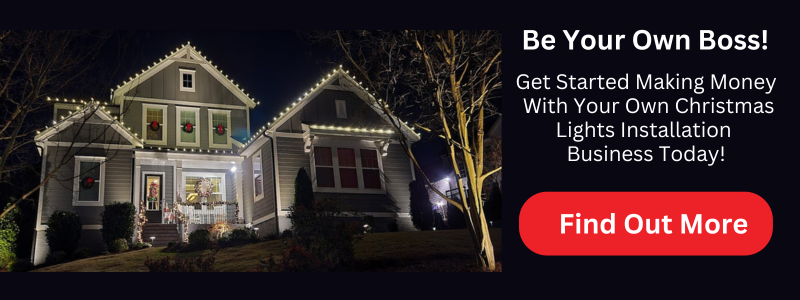
The Lead Generation Imperative: Marketing Math That Scales
The secret to scaling isn't installation skill or crew efficiency—it's lead generation. You can be the world's best installer, but if your phone doesn't ring, your skill is worthless.
Investment Requirements by Revenue Target
$50,000 Revenue Target: Invest $5,000 in marketing (10% of revenue) $100,000 Revenue Target: Invest $10,000 in marketing $500,000 Revenue Target: Invest $50,000 in marketing $1,000,000 Revenue Target: Invest $100,000 in marketing
One successful pressure washing business owner was a garbage collector four years ago. Last year he generated over $1 million in revenue—by investing $100,000 in marketing. That wasn't an expense; it was an investment that returned 10x.
The Time vs. Money Trade-Off
You have two paths to generate leads:
Option 1: Time Investment (Zero Budget)
Create 2-5 social media videos daily
Post 10-15 times daily across platforms (Facebook, Instagram, TikTok)
Knock 100+ doors weekly in target neighborhoods
Deploy 100-200 yard signs weekly
Engage in local Facebook groups constantly
This approach works—multiple installers generate $500,000+ annually with zero advertising budget. But it requires treating content creation and community engagement as a full-time job.
Option 2: Financial Investment
Facebook advertising: $15-$30 per lead
Google advertising: $20-$50 per lead
Professional SEO and web development
Direct mail campaigns
Professional photography and videography
Most successful scaled businesses use a hybrid approach: consistent organic content creation supplemented by strategic paid advertising during peak season.
The Lead Generation Reality Check
To generate 1,250 leads (the requirement for $500,000 at $2,000 average ticket and 20% close rate), you must implement multiple channels simultaneously:
Yard Signs: 500-800 signs deployed throughout the season
Social Media: Daily posting and engagement across all platforms
Paid Advertising: $200-$500 daily budget during November-December
Google Business Profile: Daily posts, systematic review collection, immediate response to all reviews
Website SEO: Professional site optimized for local search
Referral Systems: Incentivized referrals from existing customers
One installer posted over 105,000 views on Facebook in 28 days by taking action consistently. That translates to dozens of inbound leads without spending a dollar on advertising.

Hiring and Scaling Operations: Building Systems That Work
At $50,000 revenue, you can operate solo or with one helper. At $500,000, you need systems and teams.
Crew Requirements by Revenue
$50,000-$100,000: 1 crew (owner + 1 helper or owner solo) $100,000-$250,000: 1-2 crews (2-4 people) $250,000-$500,000: 2-3 crews (4-6 people) $500,000-$1,000,000: 3-5 crews (6-10 people)
The right number depends heavily on average ticket. Higher average tickets require fewer crews for the same revenue.
The Hiring Philosophy
Most installers blame employees when retention fails. "I went through 20 people last season—nobody wants to work."
If you've terminated 20 employees, the problem isn't the employees—it's you. Self-evaluate:
Are you a good leader? Do you provide clear direction, consistent feedback, and genuine appreciation?
Do you have systems? Checklists, processes, quality standards, and training programs?
Do you pay fairly? Not necessarily the highest wages, but competitive with transparent performance incentives?
Do you treat people humanely? Respect, dignity, and understanding that employees have lives outside work?
Remember: employees will perform at 80% of your standard. If you cut corners, skip steps, or tolerate subpar work, they'll operate at 60-70% of your already-compromised standard. Excellence starts with leadership.
Finding Quality Crew Members
Target Roofers: They're already comfortable on roofs, understand fall risks, and possess the physical capability required. Your job ads should explicitly state: "Experience working on roofs required. Outdoor work in all weather conditions."
Hire Attitude Over Experience: A person with no Christmas lights experience but excellent attitude, reliability, and work ethic is infinitely more valuable than someone with years of experience and a terrible attitude. Skills can be taught; character cannot.
Implement Systematic Training: Create checklists for every installation phase. Film training videos showing proper techniques. Conduct in-field training with direct supervision initially, gradually releasing autonomy as competence increases.
The Investment Mindset: Spending to Scale
The #1 mistake installers make when attempting to scale: refusing to invest money in growth.
The SEO Scam Story
One installer paid a "web expert" $4,000 in 2014 for a website that would "make the phone ring off the hook." Six months later—zero results. The website generated no traffic, no leads, no revenue.
This pattern repeats constantly. Installers get burned by scam artists promising results they can't deliver, then refuse to invest in legitimate marketing ever again.
Another installer recently paid a company $1,700 monthly for six months ($10,200 total) for a website he doesn't even own at contract end. He's generated one driveway cleaning job from it.
The Right Way to Invest
Yard Signs: Highest ROI marketing available. $300-$500 investment in 100 signs can generate $50,000-$100,000 in revenue from a single well-placed sign generating 10-20 jobs.
Professional Photography: $500-$1,000 investment in professional installation photos elevates all marketing materials, increases conversion rates, and justifies premium pricing.
CRM Systems: Jobber, Tinsel, or similar platforms ($50-$400 monthly) systematize operations, ensure follow-up, and prevent leads from falling through cracks.
Safety Equipment: Cougar Paws ($200), pitch hoppers ($130), ladder stabilizers ($50), proper harnesses—these aren't expenses, they're life-saving investments. One prevented fall pays for all safety equipment a hundred times over.
Marketing Budget: Commit to 10% of revenue target. If you want $500,000 revenue, allocate $50,000 for marketing. This isn't discretionary—it's mandatory for scale.

The Urgency of November: Peak Season Strategy
The conversation about scaling typically happens in November for a reason: the next 3-4 weeks generate 60-80% of annual revenue for most Christmas lights businesses.
The Critical Window
Week 1 (Early November): Snow and cold weather trigger Christmas mindset. Phones begin ringing consistently.
Week 2-3 (Mid-November): Peak lead generation. Deploy maximum yard sign inventory, run highest advertising budgets, post maximum social content.
Thanksgiving Week: One day off (Thanksgiving), but leads continue flowing before and after.
Week 4 (Post-Thanksgiving to December 10th): Final installation push. After December 10th, demand drops precipitously.
If your phone isn't ringing during this window, you've failed at marketing. This isn't the time to "wait and see if it picks up"—it's the time to panic and implement emergency lead generation tactics.
Emergency Lead Generation Tactics
Deploy Every Yard Sign Immediately: Don't save signs for December—they won't matter then. Deploy your entire inventory by mid-November.
Post 10-15 Times Daily: Overwhelming social media presence during peak season. People need to see your work everywhere.
Knock 100+ Doors Weekly: Physical presence in target neighborhoods generates immediate quotes and creates word-of-mouth momentum.
Answer Every Lead Within 60 Minutes: Speed-to-lead determines conversion more than any other factor. Leads contacting multiple installers book with whoever responds first with a professional quote.
Follow Up Aggressively: Contact outstanding quotes daily. November leads go cold in 48-72 hours if not followed up systematically.

How long does it realistically take to scale from $50,000 to $500,000?
Most installers following proven systems achieve this in 2-4 years. First year generates $50,000-$100,000 establishing reputation and systems. Second year reaches $150,000-$250,000 with refined processes and stronger marketing. Third year breaks $300,000-$500,000 with established brand recognition and systematic operations. Aggressive operators can compress this timeline, but expecting it in one season is unrealistic unless you have significant capital for massive marketing investment.
What's the single most important metric to track for scaling?
Average ticket price determines everything else. Track it weekly by dividing total revenue by completed jobs. If it's below $1,500, you're quoting inadequately and making scaling nearly impossible. Above $2,000, scaling becomes mathematically achievable with reasonable lead flow and operational efficiency.
Should I hire before I have enough work to keep them busy?
No. Hiring ahead of demand creates financial stress and forces acceptance of unprofitable jobs to "keep crews busy." Build lead generation systems first, then hire when you're consistently turning down work or working unsustainably long hours. The correct hiring trigger: you're personally working 60+ hours weekly and still can't complete all sold jobs within customer timelines.
How do I get 2,500 leads needed for $500,000 at $1,000 average ticket?
You probably can't sustainably, which is why that model fails. At $2,000 average ticket requiring 1,250 leads, the strategy becomes: deploy 500+ yard signs throughout season, run $5,000+ monthly advertising budget during peak season, post 5-10 times daily on social media, maintain 50+ five-star reviews, optimize website for local SEO, and implement systematic referral requests. This generates 100-150 leads monthly during peak season.
What percentage of revenue should I invest in marketing?
Minimum 10% of your revenue target. If you want $500,000 revenue, allocate $50,000 for marketing. Many successful operators invest 15-20% during growth phases. This includes paid advertising, yard signs, website development, professional photography, CRM systems, and all lead generation activities. Refusing to invest guarantees you'll stay stuck at current revenue levels.
Is it better to hire experienced installers or train inexperienced ones?
Train inexperienced people with great attitudes. Experienced installers often bring bad habits, resist your systems, and demand premium wages based on experience that may not align with your quality standards. Someone with roofing experience, excellent attitude, and strong work ethic becomes productive within 2-3 installations with proper training. Create training videos, detailed checklists, and supervised initial installations to accelerate competency development.

How do I overcome fear of sending $3,000-$4,000 quotes?
Remember you're not selling to people like you—you're selling to affluent customers with completely different financial perspectives. Their monthly mortgage exceeds what you're charging for the entire season. They spend more annually on coffee than your installation costs. The discomfort you feel sending premium quotes is your limiting belief, not market reality. Test it: send 10 comprehensive $3,000+ quotes and track results. You'll discover customers accept premium pricing when presented with clear value.
What's the fastest way to increase average ticket from $1,000 to $2,000?
Quote everything on every property—never send a quote with only the front roofline. Include ridge lines, ground stakes, trees, columns, wreaths, and garland on every single quote as options customers can select or decline. This single change typically increases average ticket 30-50% immediately as customers self-select add-ons you weren't previously offering. Use professional mockup software (Holiday Home Concepts, Canva, or similar) to visualize the complete installation.
Should I focus on residential or commercial accounts for scaling?
Residential provides more consistent volume with less seasonality in decision-making. Commercial accounts (HOA entrances, shopping centers, churches) offer larger individual projects but fewer total opportunities and longer sales cycles. Most successful $500,000+ businesses are 70-80% residential with strategic commercial accounts supplementing revenue. Commercial should be pursued opportunistically, not as primary growth strategy.
What's the biggest mistake installers make when trying to scale?
Refusing to invest in marketing while expecting revenue to magically increase. Installers want to scale from $50,000 to $500,000 while maintaining the same $500 annual marketing budget that generated their current revenue. Scale requires proportional marketing investment—there's no way around it. The second biggest mistake: keeping average ticket at $1,000 while trying to scale, which creates operational complexity that makes $500,000 nearly impossible to achieve profitably.
Scaling from $50,000 to $500,000 isn't mysterious—it's mathematical. Increase average ticket to $2,000+ through comprehensive quoting. Generate 1,250+ leads annually through systematic marketing investment. Build 2-3 excellent crews through proper hiring, training, and leadership. Implement CRM systems that ensure no lead falls through cracks.
The installers generating $500,000-$1,000,000+ annually aren't special—they simply understand the mathematics of scaling and execute consistently. They quote comprehensively, invest proportionally in marketing, build systems that work without them, and maintain premium pricing that justifies the operational complexity.
You're in the peak season window right now. The next 3-4 weeks determine whether you hit your annual revenue target or fall short. Answer every lead within 60 minutes. Send comprehensive quotes immediately. Follow up relentlessly. Deploy every yard sign you own.
The math works if you execute the systems. Now go take action and make it happen.
Copyright ©2026 All Right Reserved website designed by christmaslights.io
Terms of Service / Privacy Policy
Have questions or need assistance?
Contact us at (855)619-LITE


